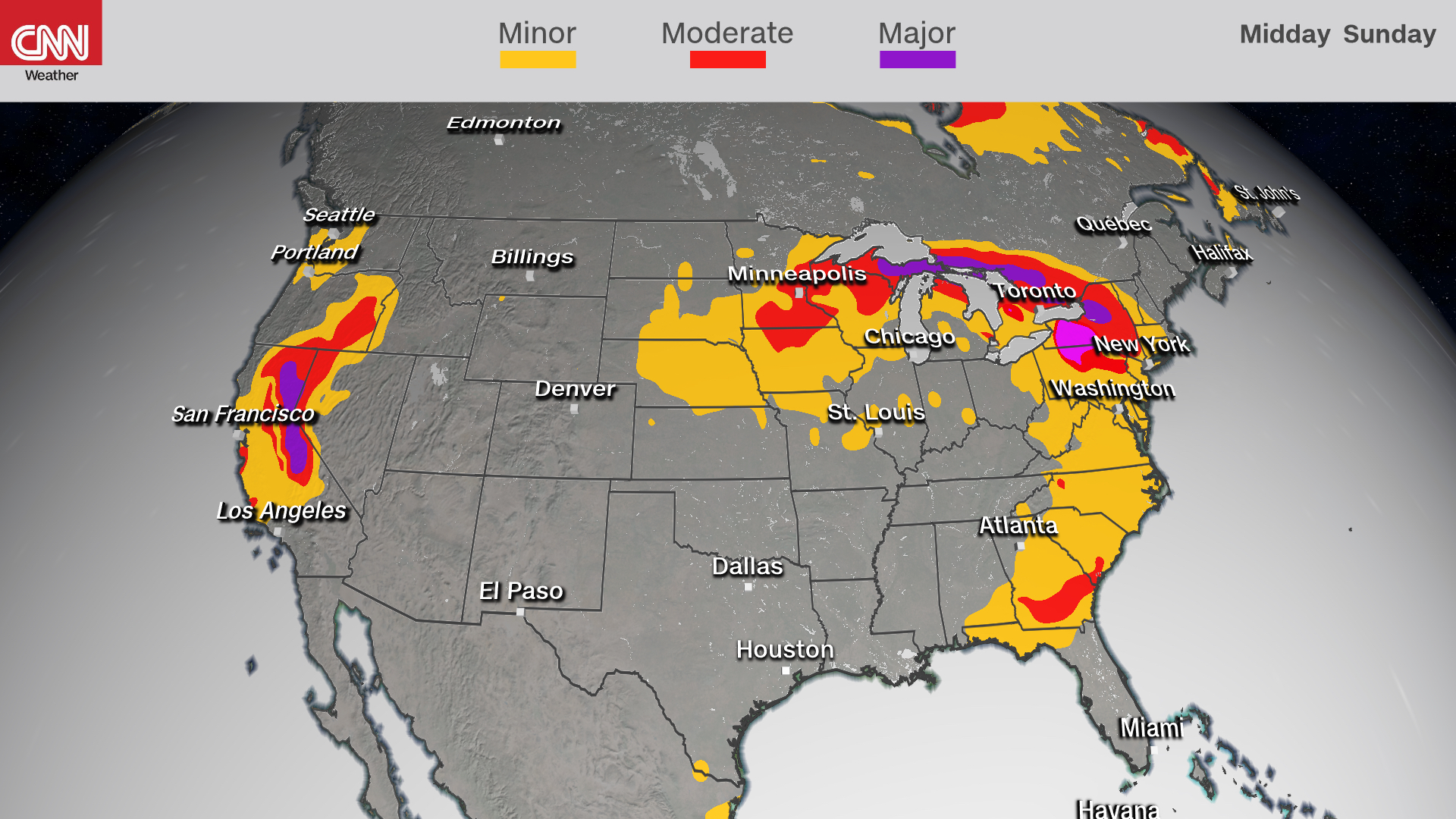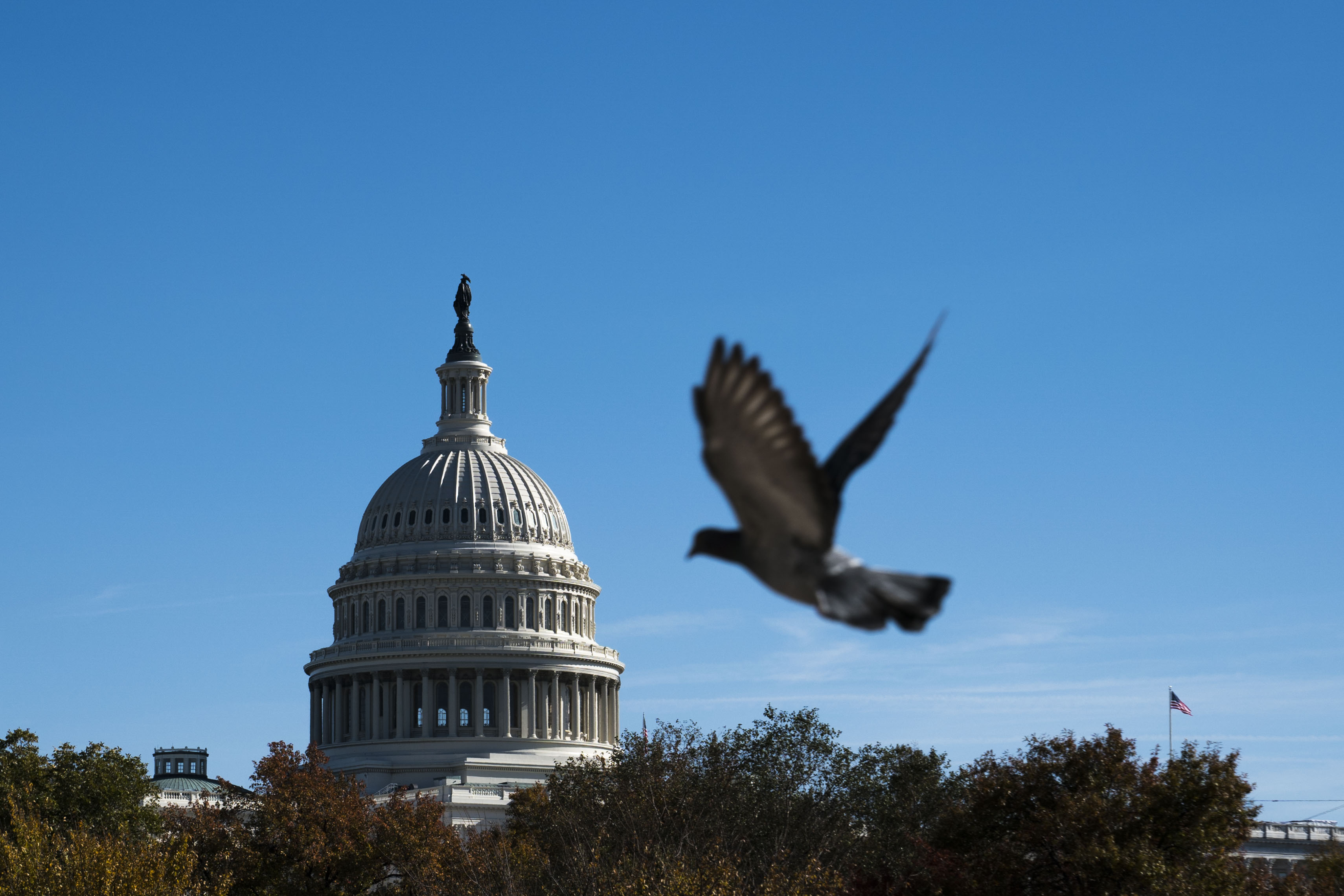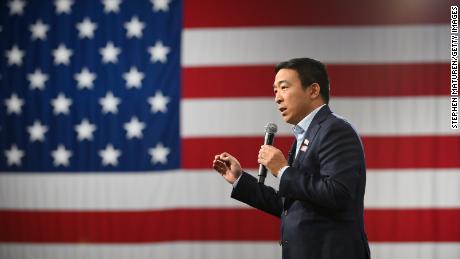
Kalimantan, Indonesia (CNN) — Deep within the jungles of Indonesian Borneo, illegal fires rage, creating apocalyptic red skies and smoke that has spread as far as Malaysia and Singapore.
People are choking. Animals are dying.
This is no ordinary fire. It was lit for you.
Farmers are clearing land the fastest way they know how to cash in on growing demand for palm oil, which is used in half of all supermarket products, from chocolate to shampoo.
They’re not only burning the forest, they’re destroying the peatlands that lie beneath it — the world’s largest natural terrestrial carbon sink.
Fire data by NASA FIRMS, NRT VIIRS 375m Active Fire product, for all of September 2019. Map credit: Maps4news.com/©HERE
Experts say the annual infernos have ignited a climate bomb with disastrous consequences for the world in years to come.
And the fires will keep burning, they say, until Western consumers say no.
Firefighters work in tropical heat, breathing toxic air, for as little as $8 a day.
Some fires are so remote they must travel more than an hour in wooden boats loaded with equipment, then hike several miles through the jungle.
At the fire front, they dig makeshift wells and rig up generators to pump water to douse the flames.
“We are fighting here almost two weeks already … stay in here, sleep in here,” Krisyoyo, leader of a patrol team with the Center for International Sustainable Tropical Peatland (CIMTROP) says, as he hoses down flames. “The fire (is) coming I think from humans,” says Krisyoyo, who like many Indonesians only goes by one name.
About 9,000 firefighters were deployed to fight the fires on the ground this summer.

Helicopters are bombing them from above.
CNN boarded a Soviet-designed Mi-8 helicopter for a water-bombing mission near the epicenter of the fires over Central Kalimantan.
Ukrainian pilot Ivan Kravchenko hovered his aircraft over the Kahayan River and scooped up 4,000 liters of water in a giant bucket hanging from a hole in the floor of the chopper. It was then dumped on the flames — a process repeated dozens of times during our flight.
Kravchenko is one of a team of specialist pilots, many of whom have been brought in from Kazakhstan and Ukraine, who fly up to three missions a day.
“Whole time dangerous,” says Kravchenko. “Because it’s all flight at low altitude and sometimes in bad visibility, so we need to be very careful.”
They can never be sure if the fire is out.
Fires smolder deep underground in thick layers of dead plant matter –- peatlands — and can reignite almost as soon as they’re extinguished.
“When they start burning, it feels like a losing battle,” says Alpius Patanan, head of the local emergency operations division.
These fires were ignited by humans, but can only be put out by nature.
“My hope is rain will be coming faster, and rain hard,” Krisyoyo says. “Hopefully our forest (will) still (be) standing, for the future.”
At the peak of the fires in September, the sky turned orange.
“It was just like science fiction,” says Dr Kevin Sutrapura from Palangkaraya Hospital, the main hospital in Central Kalimantan.
“It’s always like an orange filter, everything is orange … it was dark here, like 12 o’clock in the afternoon, it feels like 5 p.m.”
This summer, nearly 920,000 people were treated for acute respiratory problems caused by the fires, according to the Indonesia’s disaster agency.
“People were coming, panicking,” says Sutrapura.
“We decided to open an oxygen house, where people could start to use oxygen, in there we could screen which ones are the patients who need another type of advanced medical care.”
Many of the people who needed treatment came from small villages.

Palm oil may be exposing many in this developing country of 264 million people to severe health risks.
Yet it’s also bringing wealth.
“Before I grew palm fruit, I couldn’t afford to often feed chicken to my children,” says Talan, an oil palm farmer from Berau, East Kalimantan. “(Now) I can feed them different foods including chicken. I can also afford to buy appliances like a TV and a refrigerator.”
Talan is one of the smallholders that make up around 40% of Indonesia’s palm oil producers.
He farms two hectares of land with a total of 400 oil palm trees, which he harvests twice a month.
He says he has quadrupled his monthly earnings to $400, compared to when he farmed rice or rubber a decade ago.
Village chief Surya Emi Susianthi says palm oil has transformed the entire community.
“Years ago, many here did not have cars and their children did not go to school because they couldn’t afford to pay school fees,” Susianthi says.
“But after growing palm trees, they can buy cars, build good houses and put their children in school.”
Borneo is home to one of the world’s oldest rainforests.
It’s a living, breathing natural history museum filled with 15,000 plants, 420 types of bird and 222 mammals — many of them unique to Borneo.
The known inhabitants include pygmy elephants, clouded leopards, sun bears, mouse deer, flying fox bats, pangolins, and most famous of all, the Bornean orangutan.
One of the closest genetic relatives to humans, these great apes share 97% of our DNA.
Orangutan even translates to ‘man of the forest’ in Indonesian.
“Orangutans are incredible animals in many ways, they’re very human-like,” says Mark Harrison, a Co-Director for the Borneo Nature Foundation who studied orangutans for a PhD.
“They have very complicated social lives and they’re really intelligent animals.”
But these precious mammals are now one of the most critically endangered species on the planet.
Popi arrived at the Center for Orangutan Protection (COP) when she was a few weeks old.
The charity, in Berau, East Kalimantan, is Indonesia’s only orangutan rehabilitation center founded and run by local staff.
Many of the rescued animals are victims of deforestation, including Popi.
“Popi is too lazy today. She just wants to play with the human,” release handler Nursanti says, as she nudges the baby orangutan up a tree trunk in the forest.
Almost every day, the staff escort the orangutans into the jungle for what they term “forest school,” so they can learn how to climb trees, find food and make nests.
The aim is for successful pupils to graduate to “college” — COP’s orangutan island on the nearby Kelay River.

There, they are left alone, but regularly fed and monitored, and if they adapt well, they will eventually be released into the wild.
CNN takes a trip to orangutan island on a long, narrow, motorized canoe.
There, we find Michelle, an eight-year-old female who was released onto the island in May. She is not doing well.
She lumbers towards our boat when we come near, and appears to want to interact with us. But orangutans don’t like water, so she quickly edges away from the shoreline.
Later, we see her swinging in the trees. Her handlers say she usually spends too much time on the ground for an arboreal species, and she relies mostly on them to bring her food.
It’s dangerous for orangutans to be too tame.
“The predator is not only the animal but also the human,” Nursanti says. “Sometimes we try to make them afraid, then they can survive.”
“Last year we found an orangutan hit with 130 bullets,” says COP Director Ramadhani, who goes by one name.
The orangutan was found by villagers in East Kutai, in East Kalimantan. It was taken for treatment to the Kutai National Park in nearby Bontang, but died of its injuries.
At the local district court, authorities say the four accused in the case were each found guilty and sentenced to seven months in prison and fines of 50 million rupiah (about US$ 3,500). But then the fine was replaced by two months in jail, making a total sentence of nine months each.

In Indonesia, it’s illegal to kill orangutans — punishable by up to five years in prison and a 100 million rupiah fine ($7,100). But Ramadhani says the penalties are too weak to act as a deterrent.
He says the orangutans’ real enemy is palm oil.
“Please no more. Just stop it,” Ramadhani says of the forest-clearing operations. “I think it’s enough palm oil in here.”
“My dream is in 20 years, I bring my daughter, (and) go to the forest,” he says, his eyes welling up with tears. “Real forest where they can eat fruit, they can see the animals, real animals, not in a zoo. I want my daughter to see that.”
A different sort of human threat to the orangutan habitat may also be on the horizon: the planned move of the Indonesian capital, Jakarta — the fastest-sinking city on earth, due to rising sea levels — to a largely unsettled part of Borneo in East Kalimantan.
The government says the development will not harm the environment, but campaigners are concerned.
“There needs to be a very clear policy and implementation (on) how to reduce the impact of having that new capital,” says Annisa Rahmawati, a forest campaigner for Greenpeace Indonesia. “There is a potential natural reserve in there, (which) will be destroyed and damaged.”
Indonesia in the midst of a modern-day gold rush.
In less than 20 years, the country’s palm oil exports have surged almost 1,500% to $20.7 billion in 2017. It’s now the country’s number one export.
Indonesia supplies more than half of the world’s palm oil.
Each of us is estimated to consume 17 pounds (8 kilograms) of it per year.
Palm oil is used in around half of all products found in supermarkets, including margarine, ice cream, pizza and soap. In parts of Africa and Asia, it is also widely used as a cooking oil.

Driving through the once pristine landscape of Indonesian Borneo, the devastation wrought by palm oil plantations begins to hit home.
For hours, we pass by miles and miles of uniform rows of oil palms, and we’re regularly overtaken by large trucks steaming past piled high with palm fruits, or carrying the crude oil.
Palm oil originated in Africa and was brought to Indonesia and Malaysia during the colonial era.
It has become known as a wonder crop for tropical climates, due to its versatility and high yield compared to other vegetable oils like soy, coconut or sunflower.
Increasingly, palm oil is being used for biofuels, driven by climate policies encouraging the use of planet-friendly alternatives to oil and gas.
But in reality, palm oil biodiesel emits three times more carbon emissions than fossil fuel diesel, when you take into account its other environmental costs, according to the European Federation for Transport and the Environment, citing a 2016 Globiom study.
Despite this, many countries use palm oil biodiesel to count towards their targets under the Paris Climate Agreement.

The EU has now started phasing out this type of biofuel, until it becomes more sustainable and does not cause deforestation.
Indonesia plans to contest this ruling at the World Trade Organization.
The size and scale of the palm oil industry, and its impact on public health and the environment, is now causing alarm bells even among industry insiders.
“It’s now way out of our control in Indonesia,” says Tiur Rumondang, Indonesia Country Director for the Roundtable for Sustainable Palm Oil (RSPO). “I think it’s because we just let them grow organically, without a very clear plan.”
The RSPO, a global sustainable certification body, was created in 2004 in response to growing criticism of the palm oil industry.
“Our goal is to transform the market, to make the sustainable palm oil a norm,” Rumondang says.
<!–
–>
The RSPO prohibits its members from starting land clearance fires and from planting on peatlands, and monitors plantations using satellite technology.
Currently, the RSPO only represents a fifth of the industry in Indonesia, and often the non-certified companies flout the regulations, Rumondang says.
Despite the extent of this year’s crisis, there is still no sense of urgency within the industry to make big changes, so the fires are likely to keep happening, she warns.
The government is sending mixed messages.
In September 2018, Indonesian President Joko Widodo, who is known as Jokowi, imposed a moratorium on new palm oil plantations using government land, and established a peatland restoration agency.
<!–
–>


Yet this summer, in the midst of the forest fires, the government mandated an increase in the use of palm oil blended with diesel to make biofuel for the domestic market, to reduce oil import costs.
Indonesia’s biodiesel production is expected to increase 43% to 8 billion liters in 2019, a USDA report says.
Despite that, the President says restoration of the forests is a key priority.
“Of course, the replanting of forests will be pushed, especially for conserved areas,” he said. “In the next five years, we will focus on this, so that forests in Indonesia can be protected from destruction.”
Two barefoot suspects walk into the room dressed in orange jumpsuits, their faces covered by balaclavas to protect their identity.
They are among 228 people arrested in six provinces affected by fire this summer, according to figures from the Indonesian police.
The men are accused of starting fires in the city of Palangkaraya, in Central Kalimantan, and agreed to speak to CNN on condition of anonymity.
One of the men says he was burning grass cuttings near his home and later doused the fire with water, convinced he had put it out.
Local police say the fire continued to burn deep underground on peatland and three days later, it had wiped out around 10 hectares of land.
“On the outside, on the surface, it’s snuffed out, but underground the ember was still burning,” says Edie Sutaata, Adjunct Police Commissioner with Palangkaraya Police. “It took weeks for the fire to be completely extinguished.”

The second prisoner said he started a fire to clear some land in order to build a new hut.
“I made a little fire. It immediately spread,” he said, adding that the punishment of 10 years in prison is too harsh for accidental cases.
“I didn’t create that much of a fire,” he says. “It was just so I could build a hut. And it’s on my own land.”
A lack of intent is not a defense, Sutaata says. “If someone through negligence causes a fire that endangers the public, the act is considered a crime.”
Better public awareness is needed to prevent small fires such as these being started, he says. Education is also needed on a provincial level to warn people of the risks.
“Every time we are lax about public education and law enforcement, the people will start burning the forest and the land again,” Hendra Rohmawan, the Grand Commissioner of Central Kalimantan Police says.
Offenders can be fined up to 10 billion rupiah ($700,000) and face up to 10 years in prison.
“Forest fire is a serious crime,” says Rasio Ridho Sani, Director General of Law Enforcement for Indonesia’s Ministry of Environment and Forestry tells CNN.
<!–
–>
Sani says the government has multiple ways of targeting companies accused of starting the fires. After the forest fire crisis in 2015, a special taskforce was created to help preserve the forests.
Since then, 21 cases were brought to court, three palm oil companies have had their licenses revoked, and 64 administrative sanctions have been imposed.
“We hope that our intensive effort in law enforcement, using administration sanctions, civil lawsuits and also criminal law, will create deterrent effects,” Sani says.
The problem is, they aren’t.
The courts have ruled on nine of the court cases so far, handing out a total of $250 million in fines. But Sani admits that only one fine has actually been paid.
“All the companies that were taken to court and had a guilty verdict, they’re not paying the sanctions to government,” says Ratri Kusumohartono from Greenpeace Indonesia. “It accomplishes nothing, it doesn’t give them (a) deterrent effect on why they should stop burning and stop draining peatlands.”
“What we need (is) the total change in how to enforce the current laws.”
A government audit this year found that 81% of palm oil plantations broke regulations, including encroaching on protected areas and failing to meet national sustainability standards.
“What we need (is) the total change in how to enforce the current laws,” says Rumondang from RSPO.
“If we just do it halfway, we should always expect this forest and land fire in the future. We need to change everything, not only RSPO, but also the local government, not only Indonesia but also other countries.”
The problem of palm oil is not isolated to Indonesia.
It comes back to the global companies buying the oil, and the choices of consumers.
New analysis by Greenpeace in its report ‘Burning Down the House’ accuses international companies including Unilever, Mondelez, Nestle and several others of using suppliers linked to thousands of this year’s fires. Some of the suppliers are also under public investigation for starting illegal fires, the report says.
“Companies have created a facade of sustainability, but the reality is that they source from the very worst offenders across the board,” says Annisa Rahmawati, a forest campaigner from Greenpeace Indonesia. “The companies responsible for the fires and those who financially benefit from them should be held accountable for these environmental atrocities and the devastating health impacts caused by the fires.”
US snack maker Mondelez International, which uses palm oil in products such as Oreo cookies and Ritz crackers, requires suppliers to “convert their entire supply chain” to “sustainable practices,” a spokesperson tells CNN.
“We will take action against verified fire allegations and any producers shown to be part of groups we’ve previously excluded,” the spokesperson says. “These new cases highlight the urgent need for sector-wide monitoring to provide one source of verified data about deforestation by palm oil plantation companies.”
Nestle, which uses palm oil in Kit Kat bars, is “deeply concerned about the forest fires in Indonesia” and is “strongly opposed to deforestation,” a spokesperson says.
“We are currently investigating and verifying occurrences of land cleared through burning,” the Nestle spokesperson says. “We will immediately cease sourcing from any supplier found to be linked to any deforestation activity. Ten suppliers have already been removed from the Nestle palm oil supply chain for not complying.”

Consumer goods giant Unilever — which uses palm oil products in toiletries such as Dove and Lux soaps — has been “leading efforts to end deforestation,” a spokesperson says.
“In relation to previous concerns, we have already suspended sourcing from a number of suppliers mentioned in the report,” the spokesperson says. “We are currently reviewing the full list of companies to understand any possible links to our extended supply chain and, in line with our palm oil policy, will take any appropriate action.”
In Indonesia, the dry season and the wait for precious rains is finally coming to an end, but the cost of this summer’s crisis to the environment and the local population is being laid bare. The failure to protect the rainforests known as Asia’s Amazon — a vital set of lungs for the planet — could result in one of the world’s most devastating environmental casualties in the quest for profit and human consumption.





























